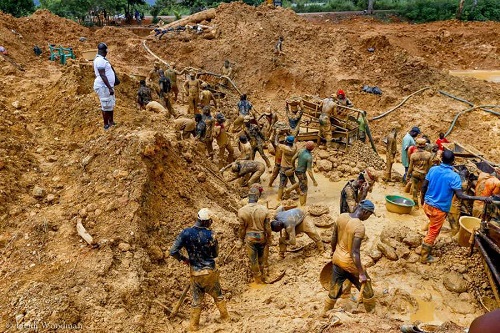Mahama’s Galamsey Double Standards Spark Fresh Controversy

President John Mahama’s recent comments on illegal mining (galamsey) have stirred heated debate, with critics describing his stance as hypocritical and inconsistent. Speaking on the issue, Mahama argued that declaring a state of emergency to combat galamsey is unnecessary, a position that has shocked many observers given the scale of destruction caused by illegal mining across Ghana.
Gold Board Questions
Mahama’s remarks come at a time when serious concerns have been raised about the role of the Gold Board. Allegations suggest that the Gold Board is actively buying gold from small-scale and galamsey operators. When pressed on this issue, Mahama deflected, insisting that the Board uses “tracking systems,” though he failed to explain the exact source or credibility of such monitoring. This has led to questions about whether the state itself is indirectly legitimizing illegal mining activities.
Double Standards on Small-Scale Mining
Even more contentious is Mahama’s shifting tone on small-scale mining. While in government, his administration cracked down on illegal mining, citing environmental destruction and economic losses. Yet in opposition, he now insists that small-scale miners should be encouraged rather than vilified. In what many see as a political maneuver, Mahama has even supported sending Ghanaian miners to Australia for training on sustainable small-scale mining—raising eyebrows over why such strategies were not pursued during his tenure.
Shocking Revelations at the Ports
Adding fuel to the controversy, a Joy FM presenter disclosed that nearly 200 excavators are cleared daily at the Tema port, destined for mining activities. This revelation has alarmed environmentalists, who fear that such heavy machinery will only accelerate land degradation, water pollution, and deforestation.
The Bigger Picture
Illegal mining remains one of Ghana’s gravest challenges, destroying arable lands, polluting rivers, and undermining the country’s fight against climate change. Critics argue that Mahama’s softer tone toward galamsey in opposition reflects political expediency rather than a genuine strategy for reform. For many Ghanaians, the question remains: is the fight against galamsey being sacrificed on the altar of political convenience?
Editorial Note
If Mahama believes that Ghana must copy Australia’s model for small-scale mining, then he must also admit that his administration failed to establish such systems when he had the chance. The inconsistency is glaring: as president, he treated galamsey as a national crisis; in opposition, he now frames it as a livelihood that should be supported. This double standard raises serious doubts about whether his current position is driven by conviction—or merely by the politics of opposition. Ghanaians deserve leaders who speak with one voice on galamsey, regardless of whether they sit in power or outside it. Anything less is not leadership; it is hypocrisy.

